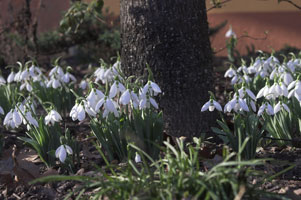|
| |
The Wider Picture
IT IS OFTEN when we are prepared to look beyond our
own grief that the Lord ministers more powerfully
through us. In a world where most people are looking
out only for themselves, it blesses the Lord when He
finds people who are eager to share the things that
are on His heart. That is why we will move far
beyond personal recovery in this section, to begin
exploring things that are grieving His heart.
|
|
|
|
For sorrow, long-indulged and slow is
to humanity a foe.
Langhorne |
|
|
| |
If everything in life has a starting
point, then, by definition, most should also have a finishing point.
The mere thought of a prolonged grief drawing to a close is a lovely
one to contemplate – not least because the “end” often marks the
start of many new beginnings.
Sometimes this happens of itself, as spring silently emerges out of
winter. At other times, it is up to us to make the effort to fully
hand over our hurts and losses to the Lord and so pull away from the
gravitational instinct to grieve, lest it become permanently
entrenched. As Lord Byron put it,
| |
Selfish sorrow ponders on
the past,
and clings to thoughts now better far removed.
Childe Harold’s Pilgrimage |
|
In one form or another, many
of us sense when the time to move on has come. After months
of mourning the death of Israel’s double-minded king, the
Lord challenged Samuel,
| |
“How long will you mourn
for Saul, since I have rejected him as king over Israel?
Fill your horn with oil and be on your way.”
1 Samuel 16:1 |
|
Effectively, God was urging
Samuel to invest his energies elsewhere. Later, when David
allowed his grief for the son he had been forced to banish
to unbalance his judgement, he became more concerned for
Absalom’s safety than for the welfare of his troops.
This so incensed his chief of staff that he warned him that
he would have no army left unless he roused himself from his
stupor and went out to encourage his troops.1 Joab’s
challenge recalled the king to his duty. It was misplaced
love on David’s part to trade the lives of his men out of
loyalty to someone in whom the fuse of hatred flamed so
relentlessly.
Some of us may find ourselves holding back from embarking on
new projects and relationships because, like David, we may
subconsciously be trying to “make up” for not having been as
faithful or as kind as we would have liked to have been in
the past. Such “compensating” can cause us to miss out on
worthwhile opportunities, and to deprive the people the Lord
is leading us to of precious truths that we have learnt
about His love and faithfulness.
One of the clearest signs that we are on the path to
recovery is when we find ourselves no longer constantly
trying to “find” the person (or role) that we have lost. We
may even have reached the point of realising that the Lord
has been using some of the events that we initially
considered to be an unmitigated disaster. Best of all, we
are willing now to embrace the new things that are coming
our way.
We know that we are well on the way towards healing when our
mind turns to subjects that have caused us great distress in
the past, and are able to think about them without our
emotions spiralling downwards in grief or guilt. Precisely
because life can never be as it was, there is no point in
trying to perpetuate the way things were before. That does
not mean that we will never again know happiness. There is
every likelihood that we will – especially if we can thank
the Lord for what He is doing, rather than hankering for how
things were.
|
|
|
|
|
Reflect and Pray |
 |
It is such a joy when all
but forgotten feelings of contentment begin to return.
Like snowdrops and daffodils pushing their way through the
frost-bound earth, it takes us by surprise to glimpse such
happiness again. Even a hint of “spring” rejuvenates our
heart, and inspires us to aim for higher goals. Our grief
may not yet have gone for good,
but even now fresh blessings and deliverances are on the
way. |
|
|
That is why the Lord
says,
I will return her
vineyards to her
and transform the Valley of Trouble
into a gateway of hope.
She will give herself to Me there,
as she did long ago when she was young,
when I freed her from her captivity in Egypt.
Hosea 2:15 |

morguefile
|
|
Lord, I greatly
desire to reach
Your highest calling for my life.
Wherever grief
is threatening to spiral out of control,
rein it in and rule in my heart.
Even as I have mourned the passing of one season,
help me take whatever steps I need to take
to allow this new one to unfold –
even if You are not ready yet to act on the things
that I am most immediately concerned about.
In Jesus’ name, Amen. |
|
Never Underestimate the Power
of Prayer
In the same way that one can observe the effects of counselling,
painkillers or antidepressants . . . prayer is measurable. No one
knows them as well, as deeply, as closely, as personally as their
God. This is a time to capitalise on that relationship; to draw
help, strength, courage, wholeness and health from it . . . The act
of seeking makes the relationship closer.
Dr Robert Buckman
We who love the Lord know that prayer is the life-blood of our
relationship with the Lord. Dr Robert Buckman, who wrote this
fascinating testimony to the power of prayer, specialises in caring
for the dying, but is not a man of prayer himself. He is by no means
the only “secular” source to affirm its efficacy.2
Read
More . . . |
References
1 See 2 Samuel 19:5-7 |
Back to top
Main Index
On
to Never Underestimate the Power of Prayer
Back to Resisting Aftershocks
Home |

